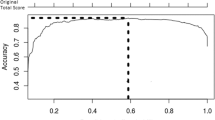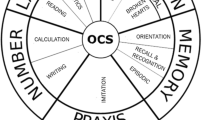Abstract
Brief screening tests would be convenient for the measurement of cognitive impairment in stroke patients. In these patients aphasia can interfere with test procedures. To evaluate the feasibility of examining cognitive functions in stroke patients we examined 129 patients with an ischaemic stroke using the CAMCOG, a standardised neuropsychological screening test, after an interval of at least 3 months. Most patients (88%) were able to complete the CAMCOG. Patients with severe aphasia were significantly more likely to have an abnormal CAMCOG score than patients without aphasia [relative risk (RR) 4.0, 95% confidence interval (CI) 2.8–5.8]. The group of patients with moderate aphasia was not at higher risk of having an abnormal CAMCOG score than patients without aphasia (RR 1.4, 95% CI 0.6–2.8). Looking for other factors that might correlate with the scores, logistic regression analysis revealed age as the only significant factor for the prediction of the CAMCOG score (odds ratio 4.0, 95% CI 1.2–13.2). We concluded that the CAMCOG can conveniently be used for screening cognitive functions in patients with cerebral infarcts, even if there is moderate aphasia.
Similar content being viewed by others
References
Basso A, Capitani E, Luzzatti C, Spinnler H (1981) Intelligence and left hemisphere disease. The role of aphasia, apraxia and size of lesion. Brain 104:721–734
Damasio AR (1992) Aphasia. N Engl J Med 326:531–539
Demeurisse G, Demol O, Robaye E (1980) Motor evaluation in vascular hemiplegia. Eur Neurol 19:382–389
Derix MMA, Teunisse S, Hijdra A, Wens L, Hofstede AB, Walstra GJM, Weinstein HC, Gool WA van (1992) CAMDEX-N. The Dutch version of the Cambridge Examination for Mental Disorders of the Elderly (in Dutch). Swets & Zeitlinger, Lisse
Desmond DW, Tatemichi TK, Hanzawa L (1994) The telephone interview for cognitive status (TICS): reliability and validity in a stroke sample. Int J Geriatr Psychiatry 9:803–807
Dick JPR, Guiloff RJ, Stewart A, Blackstock J, Bielawska C, Paul EA, Marsden CD (1984) Mini-mental state examination in neurological patients. J Neurol Neurosurg Psychiatry 47:496–499
Goodglass H, Kaplan E (1983) The assessment of aphasia and related disorders. Lea & Febiger, Philadelphia
Hendrie A, Hall KS, Brittain HM, Austrom MG, Farlow M, Parker J, Kane M (1988) The CAMDEX: a standardised instrument for the diagnosis of mental disorders in the elderly: a replication with a US sample. J Am Geriatr Soc 36:401–408
Hershey L (1990) Dementia associated with stroke. Stroke 21 [Suppl II]:II–9-II–11
Hershey LA, Jaffe DF, Greenough PG, Yang S-L (1987) Validation of cognitive and functional assessment instruments in vascular dementia. Int J Psychiatry Med 17:183–192
Hijdra A, Derix MMA, Teunisse S, Gool WA van, Kwa IH (1991) Dementia after stroke (letter). Stroke 22:416
Jacobs JW, Bernhard MR, Delgado A, Strain JJ (1977) Screening for organic mental syndromes in the medically ill. Ann Intern Med 86:40–46
Roman GC, Tatemichi TK, Erkinjuntti T, Cummings JL, Masdeu JC, Garcia JH, Amaducci L, Orgogozo JM, Brun A, Hofman A, et al (1993) Vascular dementia: diagnostic criteria for research studies. Report of the NINDS-AIREN International Workshop. Neurology 43:250–260
Roth M, Tyme E, Mountjoy CQ, Huppert FA, Hendrie A, Verma S, Goddard R (1986) CAMDEX: a standardised instrument for the diagnosis of mental disorders in the elderly with special reference to the early detection of dementia. Br J Psychiatry 149:698–709
Tatemichi TK, Desmond DW, Mayeux R, Paik M, Stern Y, Sano M, Remien RH, Williams JBW, Mohr JP, Hauser WA, Figueroa M (1992) Dementia after stroke: baseline frequency, risks, and clinical features in a hospitalized cohort. Neurology 42:1185–1193
Verhage F (1964) Intelligence and age (in Dutch). Van Gorcum, Assen
Wade DT, Langton Hewer R, David RM, Enderby PM (1986) Aphasia after stroke: natural history and associated deficits. J Neurol Neurosurg Psychiatry 49:11–16
Author information
Authors and Affiliations
Rights and permissions
About this article
Cite this article
Kwa, V.I.H., Limburg, M., Voogel, A.J. et al. Feasibility of cognitive screening of patients with ischaemic stroke using the CAMCOG A hospital-based study. J Neurol 243, 405–409 (1996). https://doi.org/10.1007/BF00869000
Received:
Revised:
Accepted:
Issue Date:
DOI: https://doi.org/10.1007/BF00869000




